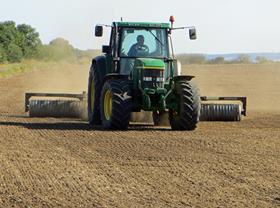
Tax breaks for farmers have caused 'subsidy addiction' and should be reviewed, a government adviser has controversially said.
Economist Dieter Helm criticised the existing support system for being wasteful, claiming tax exemptions were being used by farmers to avoid inheritance tax.
In July, Defra secretary Michael Gove wrote to Helm to ask him to advise him on the aims of a 25-year plan for the environment.
And, speaking in a 'personal capacity' on BBC Radio 4's Today programme on Saturday, Helm questioned the exemption of business rates for farmland, as well as the reduced rate of tax applied to the use of so-called 'red diesel' on farms.
According to Helm, who chairs the Natural Capital Committee, which advises Defra, the agricultural sector receives a disproportionate amount of government support.
“Farmers receive not just the £3bn of subsidy, they receive a whole range of other benefits that nobody else in the economy gets,' he said. 'What we're seeing is lots of people using farmland for the benefit of simply getting round a pretty tough tax.'
Commenting on the tax exemptions enjoyed by farmers, he added: 'In this reassessment of support and subsidies for farmland we have to put the industry on a long-term reasonable and fair basis with other perfectly legitimate industries and business in the economy.
'If you’re producing 0.7 per cent of output, receiving £3 billion of subsidies for that output of about £9bn and being exempted on rates, and being exempted on diesel and being exempted on inheritance tax, this is quite a list.
'And we’ve got there by accident almost – one after another of these concessions has been made; it’s kind of a subsidy addiction in the end.”
In response to Helm's comments, Defra said that environment secretaryMichael Gove was committed to continuing support for UK farmers.
A spokesperson told the BBC: “These ideas are not under consideration. The secretary of state has been clear that he wants to go on generously supporting farmers for many more years to come.”
In addition, Guy Smith, vice-president of the NFU, told the BBC that government support helped British agriculture to remain competitive internationally.
“What we are rightly weary of is having to compete against farmers in other parts of the world who get greater levels of support, or who have different costs of production because of different policy,” he said.
In his interview, Helm said the 25-year plan being worked on by the Natural Capital Committee would provide a framework to review the way in which the government subsidises different groups such as farmers.
But according to a government source, the committee will not advise on the details of farming policy, the BBC reported.



